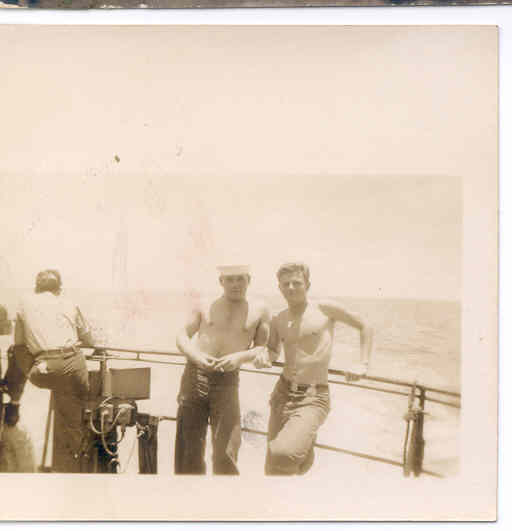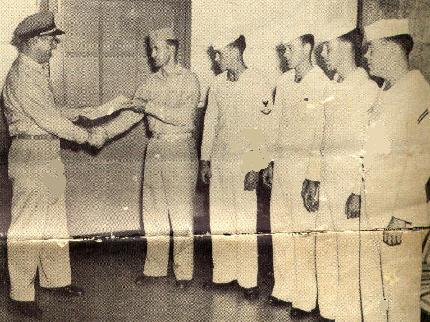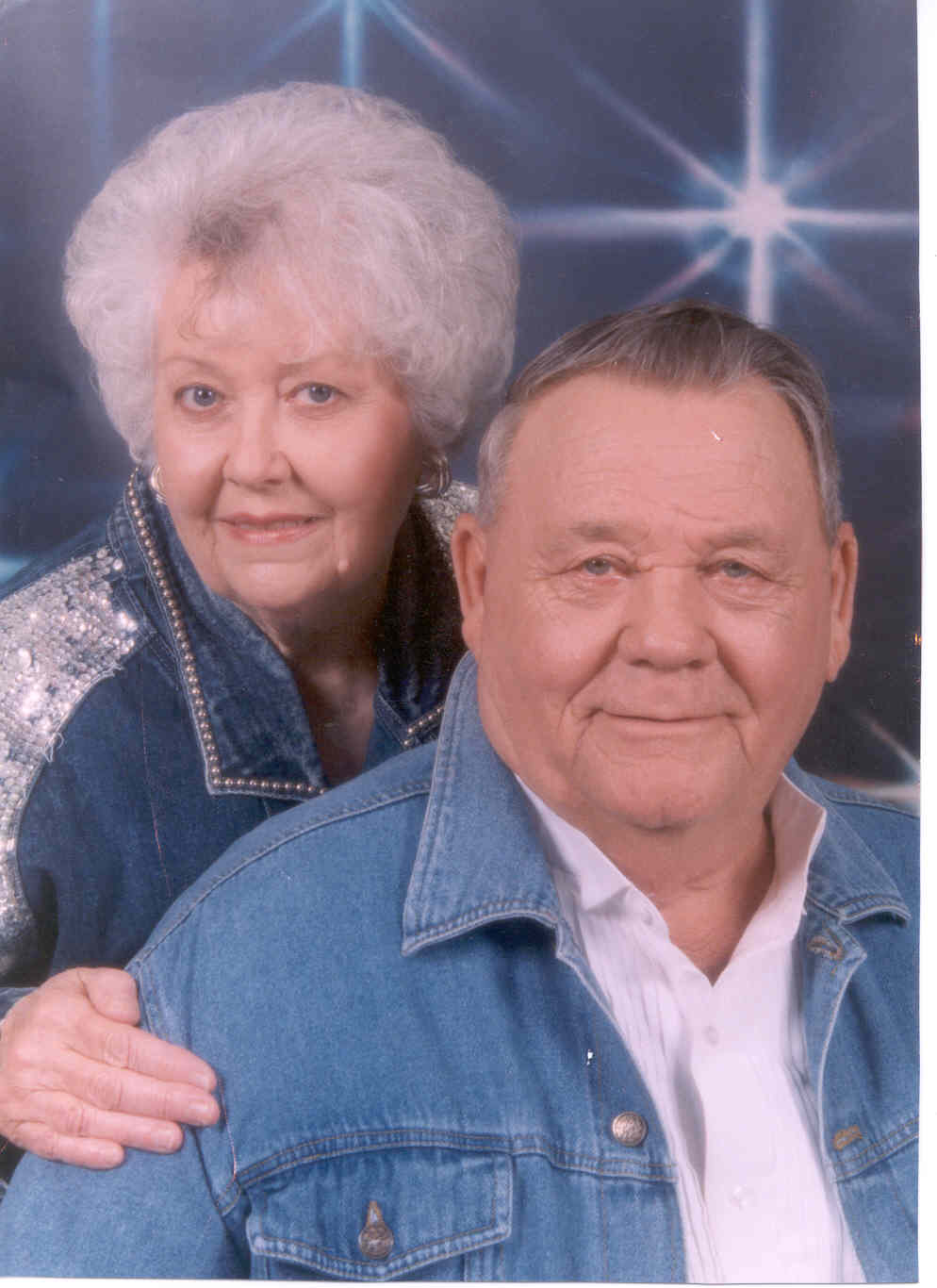TRANSCRIPTION
Why did you choose to go into the Navy instead of the Army like your older brothers and your father? Why even decide to go
into the military?
Well I had a choice...go to the military or the jailhouse. I was a little bit rowdy. Well... I guess my momma always
said I didn't wanna wear a tie. (laughs) I really didn't but I thought the Navy was a better outfit than the rest of 'em.
What was your job in the Navy?
I was a boatman's mate. I was in charge of taking care of the ship. You had hands under you that did the work that you
had them to do like shipping things and paintin'--you had to have things ship shape and clean--ready to go.
What ship did you sail on and what was it used to do?
Mitchell--The General William Mitchell. It was a transport ship--hauling troops and cargo. We hauled 4,500 troops besides
ship's company. Ship's company was 500 so that's 5,000 people--that's a lot of damn people floatin' out there in the ocean.
Do you know if this ship is still in use today?
Oh no.. Ain't nobody ride on no "boat" anymore they call 'em. (laughs) It'd take too long. They can put 'em on them airplanes and put 'em where they want 'em.
What kind of missions were you involved in?
Well our main...uhh...run was to Japan and Korea. We went into Germany all the time...they just treat you like kings.
Where in Korea did you port and what was your purpose?
Went to Hungnam and Pusan. We were there to pick up and deliver troops.
How did you feel when you heard the news that we were going to war with Korea?
If they want me, they can have me, I guess. I'd defend my country any way I could...everybody else had the same feelings, you know. Thinkin' some snotty nose, pink-eyed, yellow-bellied outfit was come over and tell us what to do. You imagine something like that. Well to give you an example, we's over there in Korea and...to go to the bathroom, the ship was in what they call dry docks, in other words, you couldn't go the bathroom on the ship so you had to go ashore. And when you go ashore to go to the bathroom they didn't have commodes. They had a thing you'd back up to, everybody--men, women and all can get in together and unload, you know. You'd be sittin' there goin' to the
bathroom and these women--natives would get in there scrubbin' the god damn thing around you while you's sittin' there. And somebody said, "Well, what if we's to lose the war and our women done that?" And I said, "I don't think our women would ever do anything like that." (laughs)It's just things to think about.

What types of medical problems did people encounter on the ship, such as sexually transmitted diseases? I have often heard that this was once a big problem in the military because of the travel done overseas.
Well, say you got it, and they had this knife deal that they'd go up your penis to open it up to drain all that. You'd rather just let it rot off.
Did the Navy provide condoms to the men to encourage the prevention of such diseases?
Oh yeah they had 'em if you wanted 'em. But like they say it's like takin' a shower with a raincoat on. (laughs)
What do you remember most about your experiences during your time spent in the Navy?
I guess the wine shops. The Saki.(laughs)
What was your biggest fear? Were you afraid of combat?
Well on the ship you weren't in combat, but you could get blowed off the ocean like anyone else. Well I'd stand watches at night and my watch was on what we called the fantail in the back of the ship, you know. And you'd get back there to thinkin' about a lot of things that could happen...and sometimes you'd see things that you imagine that kinda wake you up out there. There was one time when was goin' through the
Suez Canal that we was, I guess you could call endangered. You weren't supposed to be purchasing anything when you went through. Some of those people (Koreans) would try to sell you
liquor. You could hang a pair of your drawers down there and they'd put the liquor bottle in 'em and you'd drag it up. They told us not to do it cause they had an ordinance that the liquor people were puttin' out and sure enough it killed a couple of them guys on my ship. I was aimin' to get one and somebody
yanked it out of my hand--I was just lucky, I guess.
 What was your personal view on the war, did you feel that it was needed?
What was your personal view on the war, did you feel that it was needed?
Ahh...everybody knew it was politics...them dabbadoos up there fillin' their pockets up in Washington...lettin' us get blowed away and don't really give a rat's... That's what most of us thought about it. I guess everybody oughta just mind their own business...everybody take care of their own...That's
the only way it's ever gonna work really...Clean out from under your own front door before you start tryin' to cleanin' on somebody else's!
How do you feel that your time spent in the military has impacted and shaped your life?
Well it gave me an education on knowin' how people can treat other people when they dislike 'em. 'Course I'd have to dislike an awful lot to do things that I seen what they did to you...you know, in the war. Things like they'd cut one's (penis) off and stick it in the enemy's mouth--they did things like
this. They didn't advertise it though. I know they did cause I talked to people that seen it. Inhuman really. But it was a good education really...I got to go places and see things that I couldn't really afford. I would liked to been able to afford to take Margie to a foreign country.


ANALYSIS
I feel that through this project I learned a great deal not only of the technical side of creating an HTML document, but the history my grandfather was able to teach through his personal experiences. My grandfather has always been very reserved in
what he has told me about his experience during the Navy--especially his contact during the war. I did not realize that he had the opportunity to travel around the world twice during his time served in the United States Navy. I was impressed by his
ability to recall specific events and remember names of his shipmates. I was able to learn much about the war from my own research on the topic so it made my conversation with my grandfather have more depth as I was somewhat versed on the topic of discussion. It is kind of funny that I feel a newfound connection, one of pride and gratitude, toward
my grandfather as a result of the interview.
I feel that one can benefit from the experience of the personalization of history with an interview such as this. The only drawback that one may encounter is a way of measuring the
accuracy of the interviewee's account of history. When I posed questions of the government involvement at the time of the Korean War, my grandfather had difficulty remembering more than the President Harry Truman; he was unable to recall any of the military officials involved with the strategic part of the war. I feel that it is an effective way of learning about the past but it should not be the only way. What I mean is that we as society should not rely solely on one person's biased account of
history, but integrate it with other accounts and documents so that we may have a clearer picture of the things that happened during that time.
ANNOTATED BIBLIOGRAPHY
United States Navy
Navsource OnlineService Ship Photo Archive.
http://www.navsource.org/archives/09/22114.htm
Photos of the USS William Mitchell along with description of the ship's destination included on this
site. The final disposal of the ship is unknown per this site.
Korean War Maps (author unknown)
Korean War Project Korean War Maps.
http://www.koreanwar.org/html/maps/map2_full.jpg
This archive provided links to maps of Korea during wartime as well as information on different
battles fought.
Wright Ph.D, Chris; Korea: Its History and Culture, Seoul, Korea, Korean Overseas
Information Service 1996. This book gives much information on the culture, economics and
government of North and South Korea. On pages 86-87, the text describes the advantages the northern
part of the country had over the south.
Blair, Clay; The Forgotten War: America in Korea, Doubleday 1987.This is a very long book
so I did not have an opportunity to read all of it, but contains a concise account of the events that
occurred before, during and after the Korean War from both a military and political standpoint.
Airscoop, Sept. 22, 1950. This was a news publication put out by the Navy that my
grandfather kept. It has a picture of him and some of his shipmates being recognized for good conduct.
This newspaper also includes increases in base pay notice, and an article on the first "Negro" pilot at
Cabaniss Field.
Return to Oral History Projects

